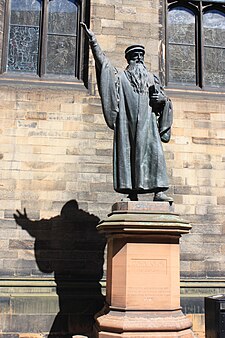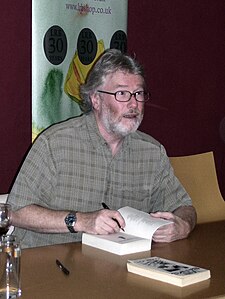| Main Page | Selected articles 1 | Selected articles 2 | Selected biographies | Selected quotes | Selected pictures | Featured Content | Categories & Topics |
Introduction
 |

|
|

| ||
Scotland (Scots: Scotland; Scottish Gaelic: Alba) is a country that is part of the United Kingdom. It contains nearly one-third of the United Kingdom's land area, consisting of the northern part of the island of Great Britain and more than 790 adjacent islands, principally in the archipelagos of the Hebrides and the Northern Isles. To the south-east, Scotland has its only land border, which is 96 miles (154 km) long and shared with England; the country is surrounded by the Atlantic Ocean to the north and west, the North Sea to the north-east and east, and the Irish Sea to the south. The population in 2022 was 5,436,600 and accounts for 8% of the population of the UK. Edinburgh is the capital and Glasgow is the largest of the cities of Scotland.
The Kingdom of Scotland emerged in the 9th century. In 1603, James VI inherited England and Ireland, forming a personal union of the three kingdoms. On 1 May 1707 Scotland and England combined to create the new Kingdom of Great Britain, with the Parliament of Scotland subsumed into the Parliament of Great Britain. In 1999 a Scottish Parliament was re-established, and has devolved authority over many areas of domestic policy. The country has a distinct legal system, educational system, and religious history from the rest of the UK, which have all contributed to the continuation of Scottish culture and national identity. Scottish English and Scots are the most widely spoken languages in the country, existing on a dialect continuum with each other. Scottish Gaelic speakers can be found all over Scotland, however the language is largely spoken natively by communities within the Hebrides. The number of Gaelic speakers numbers less than 2% of the total population, though state-sponsored revitalisation attempts have led to a growing community of second language speakers.
The mainland of Scotland is broadly divided into three regions: the Highlands, a mountainous region in the north and north-west; the Lowlands, a flatter plain across the centre of the country; and the Southern Uplands, a hilly region along the southern border. The Highlands are the most mountainous region of the British Isles and contain its highest peak, Ben Nevis, at 4,413 feet (1,345 m). The region also contains many lakes, called lochs; the term is also applied to the many saltwater inlets along the country's deeply indented western coastline. The geography of the many islands is varied. Some, such as Mull and Skye, are noted for their mountainous terrain, while the likes of Tiree and Coll are much flatter. (Full article...)
Selected article

The Scottish Reformation was the process by which Scotland broke with the Papacy and developed a predominantly Calvinist national church, the Church of Scotland (also known as the Kirk), which was strongly Presbyterian in its outlook. It was part of the wider European Protestant Reformation that took place from the 16th century.
From the late 15th century the ideas of Renaissance humanism, critical of aspects of the established Catholic Church, began to reach Scotland, particularly through contacts between Scottish and continental scholars. In the earlier part of the 16th century, the teachings of Martin Luther began to influence Scotland. Particularly important was the work of the Lutheran Scot Patrick Hamilton, who was executed in 1528. Unlike his uncle Henry VIII in England, James V avoided major structural and theological changes to the church and used it as a source of income and for appointments for his illegitimate children and favourites. His death in 1542 left the infant Mary, Queen of Scots as his heir, allowing a series of English invasions later known as the Rough Wooing. The English supplied books and distributed Bibles and Protestant literature in the Lowlands when they invaded in 1547. The execution of the Zwingli-influenced George Wishart in 1546, who was burnt at the stake on the orders of Cardinal David Beaton, stimulated the growth of these ideas in reaction. Wishart's supporters, who included a number of Fife lairds, assassinated Beaton soon after and seized St. Andrews Castle, which they held for a year before they were defeated with the help of French forces. The survivors, including chaplain John Knox, were condemned to serve as galley slaves. Their martyrdom stirred resentment of the French and inspired additional martyrs for the Protestant cause. In 1549, the defeat of the English with French support led to the marriage of Mary to Francis II of France, the French dauphin, and a regency over Scotland for the queen's mother, Marie de Guise.
Selected quotes
" ... My theory is that all of Scottish cuisine is based on a dare ... "
" ... A man may well be condemned, not for doing something, but for doing nothing ... "
In the news

- 25 April 2024 – Premiership of Humza Yousaf
- The Scottish National Party's coalition in the Scottish government with the Scottish Greens collapses as the Scottish National Party withdraws, although the party announces its intention to continue as a minority government. In response, the Scottish Conservatives call a no confidence vote against First Minister Humza Yousaf. (Reuters) (BBC News)
Selected biography

Iain Banks (16 February 1954 – 9 June 2013) was a Scottish author, writing mainstream fiction as Iain Banks and science fiction as Iain M. Banks, adding the initial of his adopted middle name Menzies (/ˈmɪŋɪz/ ⓘ). After the success of The Wasp Factory (1984), he began to write full time. His first science fiction book, Consider Phlebas, appeared in 1987, marking the start of the Culture series. His books have been adapted for theatre, radio, and television. In 2008, The Times named Banks in their list of "The 50 greatest British writers since 1945".
In April 2013, Banks announced he had inoperable cancer and was unlikely to live beyond a year. He died on 9 June 2013.
Selected picture
Loch Torridon (Scottish Gaelic: Loch Thoirbheartan) is a sea loch on the west coast of the Northwest Highlands. The loch was created by glacial processes and is in total around 15 miles (25 km) long. It has two sections: Upper Loch Torridon to landward, east of Rubha na h-Airde Ghlaise, at which point it joins Loch Sheildaig; and the main western section of Loch Torridon proper.
Photo credit: Stefan Krause
Did You Know...

- ... that Angus McIntosh was a Scottish historical linguist who used his skills to decipher German encryptions at Bletchley Park?
- ... that Julia Dawson's first Clarion Van was named for Scottish socialist Caroline Martyn?
- ... that George Balanchine's ballet Scotch Symphony, set to Mendelssohn's Scottish Symphony, evokes the style of La Sylphide, a romantic ballet set in Scotland?
- ... that backgammon was derived from the esteemed 16th-century Scottish and English tables game of Irish and eventually surpassed it in popularity?
- ... that the 2024 Hillhead by-election was the first by-election won by the Scottish Green Party?
- ... that Scottish nurse Euphemia Steele Innes was decorated with the Royal Red Cross first class for services with the Territorial Force Nursing Service in World War I?
- ... that Scottish novelist Isla Dewar said "if ... a thing is not worth doing then it's worth doing fabulously, amazingly, with grace, style and panache"?
- ... that comedian Frankie Boyle's debut novel Meantime is about a Glaswegian drug addict investigating his friend's death?
Get involved
For editor resources and to collaborate with other editors on improving Wikipedia's Scotland-related articles, see WikiProject Scotland.
To get involved in helping to improve Wikipedia's Scotland related content, please consider doing some of the following tasks or joining one or more of the associated Wikiprojects:
- Visit the Scottish Wikipedians' notice board and help to write new Scotland-related articles, and expand and improve existing ones.
- Visit Wikipedia:WikiProject Scotland/Assessment, and help out by assessing unrated Scottish articles.
- Add the Project Banner to Scottish articles around Wikipedia.
- Participate in WikiProject Scotland's Peer Review, including responding to PR requests and nominating Scottish articles.
- Help nominate and select new content for the Scotland portal.
Do you have a question about The Scotland Portal that you can't find the answer to?
Post a question on the Talk Page or consider asking it at the Wikipedia reference desk.
Related portals
Other language versions
Associated Wikimedia
The following Wikimedia Foundation sister projects provide more on this subject:
-
 Commons
Commons
Free media repository -
 Wikibooks
Wikibooks
Free textbooks and manuals -
 Wikidata
Wikidata
Free knowledge base -
 Wikinews
Wikinews
Free-content news -
 Wikiquote
Wikiquote
Collection of quotations -
 Wikisource
Wikisource
Free-content library -
 Wikispecies
Wikispecies
Directory of species -
 Wikiversity
Wikiversity
Free learning tools -
 Wikivoyage
Wikivoyage
Free travel guide -
 Wiktionary
Wiktionary
Dictionary and thesaurus
-

-

-

-

-
Random portal
Purge server cache

























